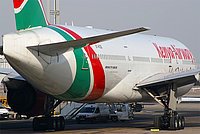Changes in the three months ago since my last review in December 2008 and also compared to February 2008, which was just over a year ago.
In 2009, oil prices and maize prices have become the national talk as scandals, shortages, and price hikes have plague these industries causing grave concern that the country could be destabilized.
With maize, a shortage of maize flour on supermarkets coupled with shady deals were highlighted in the media all leading to a motion of no confidence in Parliament against the Agriculture Minister in February 2009. it was shot down
In oil/petrol, the collapse of Triton petrol, a small politically-connected oil marketer had ripples across the industry. The firm appears to have made a big gamble and purchased and stored excessive stocks in the expectation that oil prices would remain high, but when they dropped, the firm imploded and the chief executive fled to India. It has become a monster scandal with staff losing their jobs, banks suing the government (through the oil storage and pipeline companies) and calls for another no confidence vote in Parliament, this time against the Energy Minister.
changes in the last three months
Gotten cheaper
Fuel: A Litre of petrol fuel (at local petrol station) is now Kshs. 75 (~$4.2 per gallon) which is about 20% cheaper than it was 92.7 in December 2008. Shell Petroleum led the price drop, forcing other oil marketers to follow suit and probably did in Triton with their price cut in December 2008. Petrol was Kshs. 88 a year ago
Unchanged
Staple Food: Maize flour which is used to make Ugali that is eaten by a majority of Kenyans daily. A 2 kg. Unga pack at Uchumi today costs Kshs. 96, compared to Kshs. 97 in December 2008. However it cost just Kshs. 52 a year ago
Communications: Despite the presence of two additional phone companies, the mobile price war has cooled and calls cost about Kshs. 8 (~$0.10) per minute. With Zain, the price applies across all networks, but for Safaricom it’s within their network only. New companies are offering gimmicks like Yu’s Kshs. 0.50 per minute (after making calls for two minuets at Kshs.7.50). However other prices, notably in data and equipment (handset prices) have dropped. Safaricom modem’s cost less than ½ their introduction price, and features like Picture messaging (SMS) now costs Kshs 3.50 ($0.04) (it was introduced at 20) a year ago Safaricom calls were also about 8 shillings per minute
More Expensive
Electricity: my bill last month is Kshs 1,800 – slightly less than the bill a year ago. However by looking at the components that make up the bill – fixed charge is Kshs. 240 (was 175 a year ago), fuel cost adjustment is 427c per kwh (was 199c a year ago), forex adjustment was 63c per kwh (was 31c per kwh) – all causing my bill to cost about 70% higher than my approximate consumption a year ago. This is also a sore point with Kenyan manufacturers and industries who have complained (PDF) about the high tariffs even as Kenya power & lighting company announced improved profits for 2008.
Foreign Exchange: 1 US$ equals Kshs. 80.07, it was 79.08 in December 2008. Remittances to Kenya which have dropped every month since October 2008, are partly to blame. US$1 was 70.7 shillings a year ago
Entertainment: A bottle of Tusker beer (at local pub) is Kshs. 130 ($1.60) up from Kshs. 120 in December 2008. East African Breweries, Kenya’s leading brewer, has complained about high input costs and new taxation, and for once their share price is almost as cheap as the recommended retail price of their main seller – a bottle of Tusker beer was 120 a year ago
Other food item: Sugar (2 kg. Mumias pack) is at 165, it was Kshs. 160 last December. 150 a year ago
EDIT: Also, more expensive is Housing – the rent was hiked 40% in January 2009; however that’s still about ½ what I’d be comfortable paying for a mortgage in the neighborhood.



